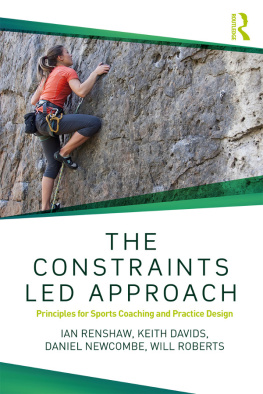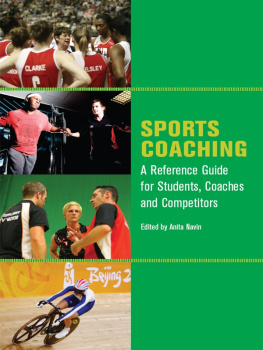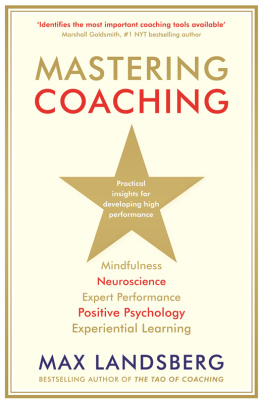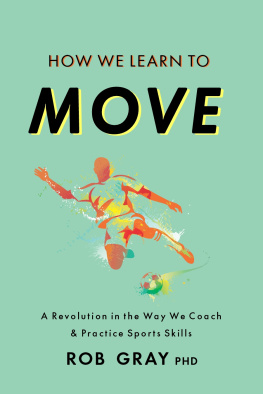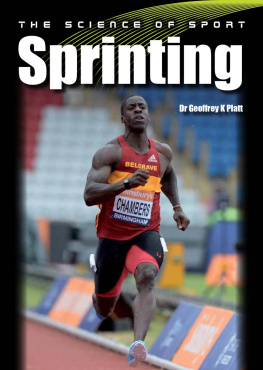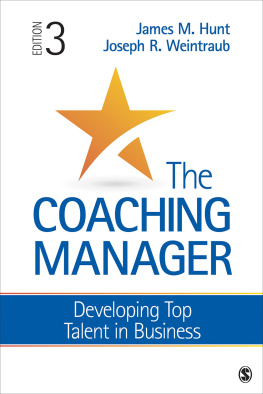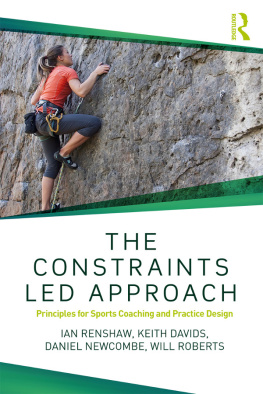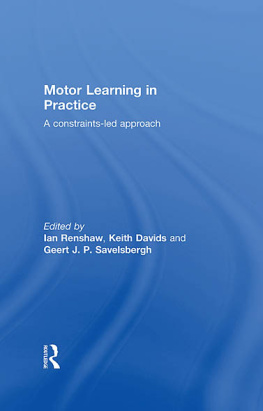
The Constraints-Led Approach
For the last 25 years, a constraints-based framework has helped to inform the way that many sport scientists seek to understand performance, learning design and the development of expertise and talent in sport. The Constraints-Led Approach: Principles for Sports Coaching and Practice Design provides students and practitioners with the theoretical knowledge required to implement constraints-led approaches in their work.
Seeking to bridge the divide between theory and practice, the book sets out an environment design framework, including practical tools and guidance for the application of the framework in coaching and skill acquisition settings. It includes chapters on constraints-led approaches in golf, athletics and hockey, and provides applied reading for undergraduate and postgraduate students of motor learning, skill acquisition and developing sport expertise.
Providing a thorough grounding in the theory behind constraints-led approaches to skill acquisition, and a foundational cornerstone in the Routledge Studies in Constraints-Based Methodologies in Sport series, this is a vital pedagogical resource for students and practising sports coaches, physical education teachers and sport scientists alike.
Ian Renshaw is an Associate Professor in the School of Exercise and Nutrition Sciences at Queensland University of Technology, Brisbane, Australia. Ian has worked in the higher education sector since 1990 delivering courses to undergraduate students and supervising postgraduate students in the UK, New Zealand and Australia. Ian has collaborated with Cricket Australia Centre of Excellence, Queensland Academy of Sport, Australian Institute of Sport and was a founder member of the Australasian Skill Acquisition Research Group.
Keith Davids is Professor of Motor Learning at the Centre for Sports Engineering Research, Sheffield Hallam University, UK. He has held professorial positions in the UK, New Zealand, Australia and Finland (Finnish Distinguished Professor 20122016). He has conducted research on elite and developmental sport programmes at the New Zealand South Island Academy, the Queensland Academy of Sport, Australian Institute of Sport, Diving Australia, Cricket Australia and the English Institute of Sport.
Daniel Newcombe is a Senior Lecturer in Sport, Coaching and PE in the department of Sport, Health Sciences and Social Work at Oxford Brookes University, UK. Daniel has worked in higher education for ten years and has been delivering Coaching: Practice to Theory modules to undergraduate students. Daniel is also an international and domestic national league hockey coach. He has been the assistant coach for the Mens Welsh National Team for the past seven years.
Will Roberts is a Senior Lecturer in Sport and Exercise Science in the School for Sport and Exercise, University of Gloucestershire, UK. Will has worked in higher education for the last 15 years and held academic teaching positions for over a decade in elite sport environments, establishing his work as a multi-disciplinarian in sport coaching research. Will developed the undergraduate and postgraduate research programmes in coaching at Oxford Brookes University, where he holds a post as visiting researcher in the Centre for Movement, Occupational and Rehabilitation Sciences (MOReS).
Routledge Studies in Constraints-Led Methodologies in Sport
A constraints-led framework has informed the way that many sport scientists seek to understand performance, learning design and the development of expertise and talent in sport, but its translation from theory to everyday coaching practice has proven challenging. Routledge Studies in Constraints-Based Methodologies in Sport provides practitioners and academics with material relating to the full breadth of the application of a constraints-based methodology in sport to in order to bridge this gap.
Introduced by a foundational text which sets out a practical design framework, and including concise books on sport-specific studies written by expert coaches, the series includes content on motor learning, skill acquisition and talent development for undergraduate and postgraduate students, and specialist knowledge on different constraints-led models for coaches, physical education teachers, sport scientists and performance analysts.
The series provides the most comprehensive, theoretically sound and practically relevant guide to understanding and implementing constraints-led approaches to skill acquisition and talent development.
Series Editors: Ian Renshaw, Queensland University of Technology, Australia
Keith Davids, Sheffield Hallam University, UK
Daniel Newcombe, Oxford Brookes University, UK
Will Roberts, University of Gloucestershire, UK
The Constraints-Led Approach
Principles for Sports Coaching and Practice Design
Ian Renshaw, Keith Davids, Daniel Newcombe, and Will Roberts
For more information about this series, please visit: https://www.routledge.com/sport/series/RSCBMS
The Constraints-Led Approach
Principles for Sports Coaching and
Practice Design
Ian Renshaw, Keith Davids,
Daniel Newcombe and
Will Roberts

First published 2019
by Routledge
2 Park Square, Milton Park, Abingdon, Oxon OX14 4RN
and by Routledge
52 Vanderbilt Avenue, New York, NY 10017
Routledge is an imprint of the Taylor & Francis Group, an informa business
2019 Ian Renshaw, Keith Davids, Daniel Newcombe and Will Roberts
The right of Ian Renshaw, Keith Davids, Daniel Newcombe and Will Roberts to be identified as authors of this work has been asserted by him/her/them in accordance with sections 77 and 78 of the Copyright, Designs and Patents Act 1988.
All rights reserved. No part of this book may be reprinted or reproduced or utilised in any form or by any electronic, mechanical, or other means, now known or hereafter invented, including photocopying and recording, or in any information storage or retrieval system, without permission in writing from the publishers.
Trademark notice : Product or corporate names may be trademarks or registered trademarks, and are used only for identification and explanation without intent to infringe.
British Library Cataloguing-in-Publication Data
A catalogue record for this book is available from the British Library
Library of Congress Cataloging-in-Publication Data
Names: Renshaw, Ian, author. | Davids, K. (Keith), 1953- author. | Newcombe, Daniel (Daniel J.), author. | Roberts, Will (William M.), author.
Title: The constraints led approach principles for sports coaching and practice design / Ian Renshaw, Keith Davids, Daniel Newcombe, Will Roberts.
Description: Abingdon, Oxon ; New York, NY : Routledge, 2019. | Series: Routledge studies in constraints-based methodologies in sport | Includes bibliographical references.
Identifiers: LCCN 2018046833| ISBN 9781138104068 (hardback) | ISBN 9781138104075 (pbk.) | ISBN 9781315102351 (ebook)
Subjects: LCSH: Coaching (Athletics) | Physical education and training. | Sports sciences.
Classification: LCC GV711 .R46 2019 | DDC 796.07/7dc23
LC record available at https://lccn.loc.gov/2018046833
ISBN: 978-1-138-10406-8 (hbk)
ISBN: 978-1-138-10407-5 (pbk)
ISBN: 978-1-315-10235-1 (ebk)
Typeset in Sabon
by Swales & Willis Ltd, Exeter, Devon, UK
Ian Renshaw: I dedicate this book to all those teachers and coaches who selflessly give so much of themselves to others.
Keith Davids: Thanks to all the sports practitioners who have adopted an ecological dynamics rationale to underpin their constraints-based approach. A special thanks to all those who have shared, and who continue to develop and share, their most invaluable experiential knowledge. Your input and open minds are invaluable and a source of inspiration as we seek ways to help individuals realise their potential, improving the learning experiences of athletes at all performance levels.
Next page
